- Home
- Jess Foley
Saddle the Wind
Saddle the Wind Read online
Saddle the Wind
Jess Foley
Random House (2011)
* * *
Tags: Sagas, Fiction
Synopsis
In a small village in the West Country a child is born: a baby girl, the fifth child of an impoverished labourer whose aspirations to be a painter are rapidly fading. For little Blanche the future would appear bleak- survival, possibly; marriage, possibly; drudgery certainly. It is by a stroke of good- and ill- fortune that Blanche's mother is requested at the 'big house', to suckle Marianne, the motherless daughter of John Savill whose wife has died in childbirth. And it is by good and ill fortune that the two babies, so different in their hopes, are brought up together caring for each other as sisters. But sisters they are not- as the outside world is keen to point out. Blanche is torn between her love for her real mother and her desire for a life of wealth and ease; and when her eyes alight on Gentry, Marianne's intended husband, her struggle against selfishness is compounded. In this original and vivid saga, Jess Foley weaves a tale of passion and pain against a background of unsentimentalized rural England.
Saddle The Wind
Jess Foley was born in Wiltshire but moved to London to study at the Chelsea School of Art, then subsequently worked as a painter and actor before taking up writing. Now living in Blackheath, south-east London, Jess Foley’s first novel So Long At The Fair was published in 2001, followed by Too Close To The Sun in 2002.
Praise for So Long At The Fair
‘Jess has really captured the sense of a family united against great odds. The heroine, Abbie, is strong but flawed as all good heroines should be and as we follow her triumphs and trials we see her change from a girl to a woman in the most dramatic and satisfying of ways’ Iris Gower
‘A compulsive and well-paced story’ Wiltshire Times
‘An earthy tale of love, longing and tragedy’ Swindon Evening Advertiser
‘A jolly good read … Abbie is a great character, buffeted by fate but a powerful woman of her time’ Susan Sallis
Also by Jess Foley
So Long At The Fair
Too Close To The Sun
SADDLE THE WIND
Jess Foley
This eBook is copyright material and must not be copied, reproduced, transferred, distributed, leased, licensed or publicly performed or used in any way except as specifically permitted in writing by the publishers, as allowed under the terms and conditions under which it was purchased or as strictly permitted by applicable copyright law. Any unauthorised distribution or use of this text may be a direct infringement of the author’s and publisher’s rights and those responsible may be liable in law accordingly.
Version 1.0
Epub ISBN 9781446429754
www.randomhouse.co.uk
Published by Arrow Books in 2004
1 3 5 7 9 10 8 6 4 2
Copyright © Jess Foley 1989
Jess Foley has asserted the right under the Copyright, Designs
and Patents Act, 1988 to be identified as the author of this work
This novel is a work of fiction. Names and characters are the product of the
author’s imagination and any resemblance to actual persons, living
or dead, is entirely coincidental
This book is sold subject to the condition that it shall not, by way of
trade or otherwise, be lent, resold, hired out, or otherwise circulated
without the publisher’s prior consent in any form of binding or cover
other than that in which it is published and without a similar condition
including this condition being imposed on the subsequent purchaser
First published in the United Kingdom in 1989 by Grafton Books
Arrow Books
The Random House Group Limited
20 Vauxhall Bridge Road, London, SW1V 2SA
Random House Australia (Pty) Limited
20 Alfred Street, Milsons Point, Sydney,
New South Wales 2061, Australia
Random House New Zealand Limited
18 Poland Road, Glenfield,
Auckland 10, New Zealand
Random House (Pty) Limited
Endulini, 5a Jubilee Road, Parktown 2193, South Africa
The Random House Group Limited Reg. No. 954009
www.randomhouse.co.uk
A CIP catalogue record for this book
is available from the British Library
ISBN 0 09 946645 7
Table of Contents
Cover
About the Author
Also by Jess Foley
Title Page
Copyright
Dedication
Saddle The Wind
Part One
Chapter One
Chapter Two
Chapter Three
Chapter Four
Chapter Five
Chapter Six
Chapter Seven
Chapter Eight
Chapter Nine
Chapter Ten
Chapter Eleven
Part Two
Chapter Twelve
Chapter Thirteen
Chapter Fourteen
Chapter Fifteen
Chapter Sixteen
Chapter Seventeen
Chapter Eighteen
Chapter Nineteen
Chapter Twenty
Chapter Twenty-One
Part Three
Chapter Twenty-Two
Chapter Twenty-Three
Chapter Twenty-Four
Chapter Twenty-Five
Chapter Twenty-Six
Chapter Twenty-Seven
Chapter Twenty-Eight
Chapter Twenty-Nine
Chapter Thirty
Part Four
Chapter Thirty-One
Chapter Thirty-Two
Chapter Thirty-Three
Chapter Thirty-Four
Chapter Thirty-Five
Chapter Thirty-Six
Chapter Thirty-Seven
Part Five
Chapter Thirty-Eight
Chapter Thirty-Nine
Chapter Forty
Chapter Forty-One
Chapter Forty-Two
Chapter Forty-Three
Chapter Forty-Four
Chapter Forty-Five
For Bev and Glenyse,
for Pamela and Robert,
and for Jackie S
To my editors Patricia Parkin and Judith Kendra,
the staff of the Trowbridge and Norwich Libraries,
and Dr Carmelo Mirabile of the Messina Tourist Board –
my gratitude.
PART ONE
Chapter One
‘Are you sure?’ he asked. His voice had the burr of the West Country; a voice usually soft but now touched with a note of weary disbelief. The woman raised her eyebrows and answered in a tone of angry impatience.
‘Of course I’m sure.’
He shook his head. ‘Jesus Christ. Why did this have to happen? As if there’s not enough to cope with already with four small mouths to feed.’ In a sudden display of anger he slammed his fist onto the table top, making the cheap shade of the oil lamp rattle on its metal base. ‘Damn it!’ he said bitterly through gritted teeth. ‘Damn and blast it!’
Sarah stood very still, watching him. She knew that with her words she was shattering what little of the dream remained.
‘How d’you feel about it?’ he said at last.
She didn’t answer. ‘No,’ he said, ‘you haven’t got the responsibility of providing, have you? Oh, yes, you bring in a few shillings each week with the washing, but how far does that get us?’
Remaining silent she turned away.
‘Have we got to have it?’ he asked. ‘Have we?’
There was a l
ittle silence, during which only the ticking of the clock could be heard, then Sarah said, ‘Yes, Ollie, we have. There’s nothing to be done about it now.’
‘Nothing?’
Briefly she closed her eyes, sighing. ‘What are you asking, Ollie? What do you want me to do?’ She had no need to ask, of course. She knew what was in his mind. The thought had been in her own at the beginning, but then the memory of her mother had come clutching at her and she had thrust the thought aside. She could never risk that happening to her. ‘We’ll manage somehow, Ollie,’ she said, then added a little more forcefully: ‘We must.’
Glancing up, she looked at the reflection of his face in the mirror beside the range. A cheap glass, it distorted his image so that his features became as seen through water, an ugly parody of those she knew so well. After a moment he came around the table, stood behind her and raised his hands to her shoulders. At his touch she shook him off. ‘Please,’ she said, ‘– don’t ask me again. It’s no use.’
‘Well, we’ve got to do something about it.’
Turning back to him she said, ‘We’re not doing anything about it, Ollie. Nothing. So you can forget that. I’m not taking the chance of leaving my children without a mother. It happened with my own mother. It won’t happen here.’
‘That’s foolish talk,’ he said. ‘You’d be all right. For God’s sake, Sarah, we haven’t got enough to live on as it is.’
‘I know, but –’ She shook her head hopelessly. ‘I’m sorry, Ollie.’
‘Look,’ he said, ‘– it’s the only thing to do – with four children already – you must see that. They’re more than enough to cope with. Damn it, we can’t afford another child. We can’t even afford the ones we’ve got.’
‘Well,’ she said quickly, ‘you should give that some thought when you start coming at me like some damned bull, not to be denied.’
He stared at her for a moment then raised his hand and struck her hard across the face. With a little cry she put a hand up to her check then turned and ran from the room.
In the small thatched cottage there was not far she could go before she reached the limits of the interior. Now, with the tears starting in her eyes she ran up the stairs and into the front bedroom, the one she shared with Ollie. There in the dark she closed the door behind her, moved to the bed and sat down, the worn springs giving a whine of protest under the weight of her small frame.
As she sat there she made an effort to choke back the tears. She wouldn’t cry. Anyway, what good would it do? There was no room in this life for indulgences. Besides, she had brought it on herself. For those moments downstairs she had so wanted to hurt him. And she had succeeded. The stinging imprint on her cheek was proof enough of that; he had never struck her before. But she had been hurt too. Not by the blow from his hand – no, not that – but by his reaction to the news of the baby. But she had known what his reaction would be. Which was why she’d put off saying anything until tonight. She’d been sure about the baby for more than a fortnight now, but she had been afraid to tell him. And so she had put it off. She’d kept on putting it off.
After a while she heard the sound of the front door closing. He was going out. Leaning closer to the window she pulled aside the thin curtain and, in the moonlight, saw him move from the front gate and start off along the lane. He would go to the Wheatsheaf – and probably wouldn’t be back till it closed.
She sighed, took up the matches and lit the candle that rested on the chest of drawers next to the bed. With the candleholder in her hand she got up and moved to the door and stepped out onto the narrow strip of thread-bare carpet that covered the tiny landing. There she stood listening outside the children’s room. All was quiet. Softly she opened the door and went in.
Inside the room she stood in the wavering light of the candle flame looking down at the nearest bed, in which slept the boys Ernest and Arthur.
Ernest, her first born, was eight years old. Arthur was four. Both boys had dark chestnut hair – her own colouring – but it was there that any likeness between the two ended. Ernest, the picture of health, slept soundly, his face slightly flushed from the past day’s sun. Arthur lay a little apart, his head further up on the pillow, as if unconsciously reaching for air and space. And while Ernest’s breath came sweet and even, Arthur’s sounded slightly laboured, coming only through his open mouth, evidence of the problems that had plagued him from his earliest days. All his life Sarah had had to give him that extra bit of care.
His lack of physical strength, though, only made her love him the more, she realized; those imperfections – his weak chest and lame right leg. And such a tiny, feeble creature he’d been at birth. She could remember so well when Ollie had first seen him. It had mattered not at all the encouragement in her voice as she’d said, ‘A son, Ollie. You’ve got another son to help you out.’ She had seen the expression of disappointment on his face.
And he had never shown affection for the child; merely toleration. And there were times, of course, when she was sure that Arthur was aware of it. How could he not be? And how could Ollie withhold his love like that? Not that he showed that much affection for the others – apart from Mary. How could it be, she wondered, that a man with so much feeling in some ways could be so lacking in it in others … ? Perhaps, though, she said to herself, there just wasn’t that much love in his heart; perhaps it just wasn’t there to give – the way some people had no sense of smell; or like Arthur with his own lack – his inability to walk or breathe as he should …
And it was partly that, too, Sarah knew – Ollie’s lack of love for Arthur – that turned her own heart even more strongly towards the boy. So many of the tears she had wept had been for Arthur. Those nights when she had held him in her arms as he had lain gasping for breath, or on those bright afternoons when, looking from the steamed-up scullery window, she had seen him hurrying, dot-and-carry, in the wake of his adored, agile, elder brother.
She sighed again and, moving silently, stepped around the end of the boys’ bed to the window where she parted the curtains and gazed out.
On the very outskirts of the village of Hallowford, the thatched cottage was the last in a row of three pairs of cottages that flanked the northeast side of Coates Lane, the narrow way that met with Gorse Hill to the south and, to the north, joined up with Elm Road. It comprised a front parlour, kitchen and scullery downstairs, and two bedrooms upstairs. The rear bedroom window at which Sarah stood looked out over the yard with the shed and the privy, and, beyond them, the garden, a narrow little strip of land bearing two small apple trees and the vegetables that Ollie had planted. The view hardly differed at all from that of the neighbours, the Hewitts, on the left. Raising her eyes slightly Sarah saw beyond the garden the dark shape of the Ridge rising up, a high cliff, its sheer, chalk face gleaming faintly in the May night.
She sighed and let the curtain fall back into place. She was tired, and her back ached from all the pails of water she had had to carry from the pump that day, from all the stooping over the washtub. Turning, she looked at the two girls asleep in the second bed, next to the wall. Mary, her elder daughter, was seven. Beside her slept Agnes. She, the youngest of all at not quite two, lay with her dark hair next to Mary’s blonde curls, her arm across her chest.
Sarah’s eyes shifted back to the peaceful face of Mary and lingered there. Mary … Yes, Ollie loved her all right, and had done so right from the moment she had been placed, red and lustily squalling, in his arms. And as the child had grown, so his love for her had grown too, quickly outstripping his lukewarm affection for Ernest, and the other two who came after. She was his if no one else was. His girl. His Mary. Of all the children only she it was who seemed truly able to reach his heart.
As she stood there the thoughts and memories came crowding in and she pictured Ollie as he had been when they had first met. He’d been beautiful – like those sculptures he’d taken her to look at that day before their marriage. That had been in the early spring of 1871. Nine years ago
. And he hadn’t changed much, really. His body was still tall and strong, his face still good-looking, his corn-coloured hair still as thick, his eyes still as blue – bluer than any eyes she had seen before or since on anyone, except perhaps Mary. And yet, she thought, Ollie’s eyes were different now. Now they were without that spark that had been there, that reflection of promise. Though he was still young. Thirty-two years old. It was the poverty that was doing it to him, the responsibility of providing for a wife and children on the little he earned from his work on the gardens of Hallowford House and the little she brought in with the washing.
But why wasn’t it bearable for him? she asked herself. And the answer, she knew, lay in his dreams. If you had no dreams, no aspirations, then you could be content; there was no wanting to get in the way.
Turning her head, she gazed around her. On the top of the small chest of drawers she could see the little tin box holding Mary’s cheap paintbrushes and paints. There too were the magpie’s feather and the robin’s nest that Ernest had found, and the boat he had made for Arthur. Above the girls’ bed hung an oil-painting depicting people picking blackberries. A second painting, a still life of apples and flowers, done on an old piece of wood panelling, hung beside the door. Ollie’s pictures were all over the house – oil-paintings of all sizes done on bits of old canvas, boards and panels, paintings on which he lavished so much concentration and quiet passion in the few spare hours his working life allowed and when he could scrape together enough spare money for a paintbrush or the odd tube of paint.
It was that that had first attracted her to him, his passion for artistic things, a sensitivity that had made him different from the rest. And, she was sure, it was that same sensitivity – blunted now by circumstances – that had got in the way of any real happiness he might otherwise have found.
As she had been so often in the past she was touched now by the warmth of pity for his wasted talent. For he had talent, she was quite sure. And it was a great talent, possibly. But his painting could not be anything more than a hobby. Not now. There was no place in their lives for dreams of anything more grand, not now – if indeed there ever had been.

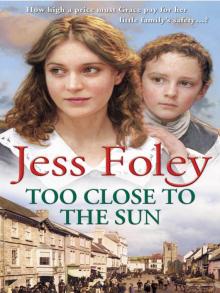 Too Close to the Sun
Too Close to the Sun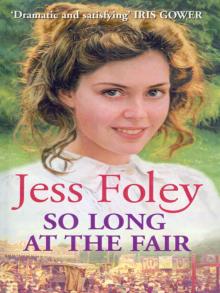 So Long At the Fair
So Long At the Fair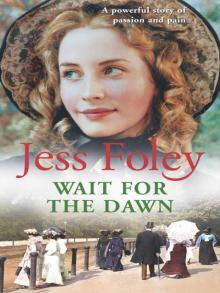 Wait For the Dawn
Wait For the Dawn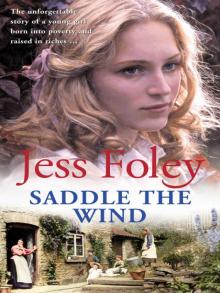 Saddle the Wind
Saddle the Wind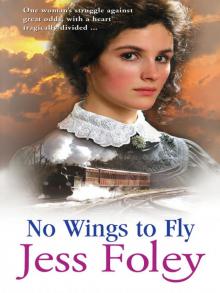 No Wings to Fly
No Wings to Fly